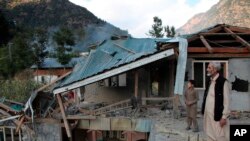Pakistan flew a group of about 15 foreign diplomats Tuesday to its administered part of the disputed Kashmir region and gave them a tour of the sites of deadly skirmishes this week with India.
The clashes erupted on Sunday after Indian forces launched cross-border artillery fire, saying the action was aimed at deterring infiltration into the Indian-held part of Kashmir from alleged “terrorist camps” on the Pakistani side.
Indian military chief Gen. Bipin Rawat told reporters following the attack his troops had destroyed at least three “terrorist camps" near the so-called Line of Control (LoC), which separates the Indian and Pakistani parts of Kashmir. Rawat asserted that “six to 10" Pakistani soldiers and as many terrorists were also killed.
Islamabad swiftly rejected the charges as groundless, saying the Indian shelling targeted the civilian population, killing five villagers and a Pakistani soldier, and destroying civilian property.
New Delhi also confirmed retaliatory shelling by Pakistani forces killed two Indian soldiers and a civilian.
Pakistani officials said Tuesday’s tour to Kashmir was arranged to enable envoys from foreign missions in Islamabad "to see for themselves that India had made false claims” about the presence of terrorist camps in the region.
Chinese, German, South African and Iranian diplomats were prominent among the group that visited Pakistani Kashmir.
The Foreign Ministry noted in a statement that Indian diplomats had also been formally invited to join on the tour to verify whether the conflict zone hosted any alleged terrorist sites.
“The Indian side has not joined us in the visit to [the] LoC; neither have they provided coordinates of the alleged “launchpads,” said ministry spokesman Mohammad Fasial.
India has not commented on the Pakistani assertions.
Alice Wells, the U.S. acting Assistant Secretary for South and Central Asia Tuesday urged both the countries to defuse tensions through direct dialogue in line with their existing bilateral agreements.
“We encourage both countries to do so and to reduce tensions along the Line of Control, enabling people on both sides to live in peace and dignity,” Wells told a congressional hearing in on human rights in South Asia.
Bilateral tensions have increased since early August when India revoked the special constitutional autonomy for the Muslim-majority portion of Kashmir that it administers. Indian security forces simultaneously unleashed a security crackdown on dissent, arresting thousands of Kashmiris, including prominent local politicians. Internet and most telecommunications services remain suspended.
Pakistan, which claims the Himalayan region in full, denounced the Indian actions and immediately downgraded diplomatic ties with the neighboring country, fueling regional tensions.
While emphasizing the need for Pakistan to take action against militant groups that seek to foment violence in Indian Kashmir, Wells said Washington has urged New Delhi to restore full access to internet and mobile phone services.
“The United States supports the rights of Kashmiris to peacefully protest but condemns the actions of those who seek to use violence and fear to undermine dialogue,” Wells stressed.
Disputes over the region, which India also claims in full, have sparked two wars and several limited conflicts between the countries.
'Kartarpur Corridor pact'
Despite the heightened bilateral tensions, the two rivals say they are close to signing a landmark agreement later this month that will give India’s minority Sikh community visa-free access to one of their holiest sites in Pakistan through a newly built cross-border corridor.
The temple in the town of Kartarpur is where the founder of Sikhism, Guru Nanak, died. It is just about four kilometers from the border with India.
The signing of the proposed pact will set the stage for inaugurating the border crossing in early November, just days before the 550th anniversary of Guru Nanak's birth.
The corridor will replace a drawn-out visa process and drastically reduce a long journey through Pakistan for Sikh pilgrims to reach the site.







